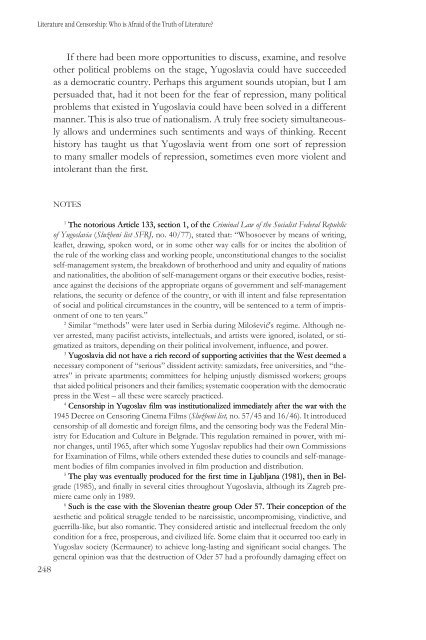Literatura in cenzura - Društvo za primerjalno književnost - ZRC SAZU
Literatura in cenzura - Društvo za primerjalno književnost - ZRC SAZU
Literatura in cenzura - Društvo za primerjalno književnost - ZRC SAZU
- No tags were found...
You also want an ePaper? Increase the reach of your titles
YUMPU automatically turns print PDFs into web optimized ePapers that Google loves.
Literature and Censorship: Who is Afraid of the Truth of Literature?If there had been more opportunities to discuss, exam<strong>in</strong>e, and resolveother political problems on the stage, Yugoslavia could have succeededas a democratic country. Perhaps this argument sounds utopian, but I ampersuaded that, had it not been for the fear of repression, many politicalproblems that existed <strong>in</strong> Yugoslavia could have been solved <strong>in</strong> a differentmanner. This is also true of nationalism. A truly free society simultaneouslyallows and underm<strong>in</strong>es such sentiments and ways of th<strong>in</strong>k<strong>in</strong>g. Recenthistory has taught us that Yugoslavia went from one sort of repressionto many smaller models of repression, sometimes even more violent and<strong>in</strong>tolerant than the first.248Notes1 The notorious Article 133, section 1, of the Crim<strong>in</strong>al Law of the Socialist Federal Republicof Yugoslavia (Službeni list SFRJ, no. 40/77), stated that: “Whosoever by means of writ<strong>in</strong>g,leaflet, draw<strong>in</strong>g, spoken word, or <strong>in</strong> some other way calls for or <strong>in</strong>cites the abolition ofthe rule of the work<strong>in</strong>g class and work<strong>in</strong>g people, unconstitutional changes to the socialistself-management system, the breakdown of brotherhood and unity and equality of nationsand nationalities, the abolition of self-management organs or their executive bodies, resistanceaga<strong>in</strong>st the decisions of the appropriate organs of government and self-managementrelations, the security or defence of the country, or with ill <strong>in</strong>tent and false representationof social and political circumstances <strong>in</strong> the country, will be sentenced to a term of imprisonmentof one to ten years.”2Similar “methods” were later used <strong>in</strong> Serbia dur<strong>in</strong>g Milošević's regime. Although neverarrested, many pacifist activists, <strong>in</strong>tellectuals, and artists were ignored, isolated, or stigmatizedas traitors, depend<strong>in</strong>g on their political <strong>in</strong>volvement, <strong>in</strong>fluence, and power.3 Yugoslavia did not have a rich record of support<strong>in</strong>g activities that the West deemed anecessary component of “serious” dissident activity: samizdats, free universities, and “theatres”<strong>in</strong> private apartments; committees for help<strong>in</strong>g unjustly dismissed workers; groupsthat aided political prisoners and their families; systematic cooperation with the democraticpress <strong>in</strong> the West – all these were scarcely practiced.4 Censorship <strong>in</strong> Yugoslav film was <strong>in</strong>stitutionalized immediately after the war with the1945 Decree on Censor<strong>in</strong>g C<strong>in</strong>ema Films (Službeni list, no. 57/45 and 16/46). It <strong>in</strong>troducedcensorship of all domestic and foreign films, and the censor<strong>in</strong>g body was the Federal M<strong>in</strong>istryfor Education and Culture <strong>in</strong> Belgrade. This regulation rema<strong>in</strong>ed <strong>in</strong> power, with m<strong>in</strong>orchanges, until 1965, after which some Yugoslav republics had their own Commissionsfor Exam<strong>in</strong>ation of Films, while others extended these duties to councils and self-managementbodies of film companies <strong>in</strong>volved <strong>in</strong> film production and distribution.5 The play was eventually produced for the first time <strong>in</strong> Ljubljana (1981), then <strong>in</strong> Bel Belgrade(1985), and f<strong>in</strong>ally <strong>in</strong> several cities throughout Yugoslavia, although its Zagreb premierecame only <strong>in</strong> 1989.6Such is the case with the Slovenian theatre group Oder 57. Their conception of theSuch is the case with the Slovenian theatre group Oder 57. Their conception of theaesthetic and political struggle tended to be narcissistic, uncompromis<strong>in</strong>g, v<strong>in</strong>dictive, andguerrilla-like, but also romantic. They considered artistic and <strong>in</strong>tellectual freedom the onlycondition for a free, prosperous, and civilized life. Some claim that it occurred too early <strong>in</strong>Yugoslav society (Kermauner) to achieve long-last<strong>in</strong>g and significant social changes. Thegeneral op<strong>in</strong>ion was that the destruction of Oder 57 had a profoundly damag<strong>in</strong>g effect on
















